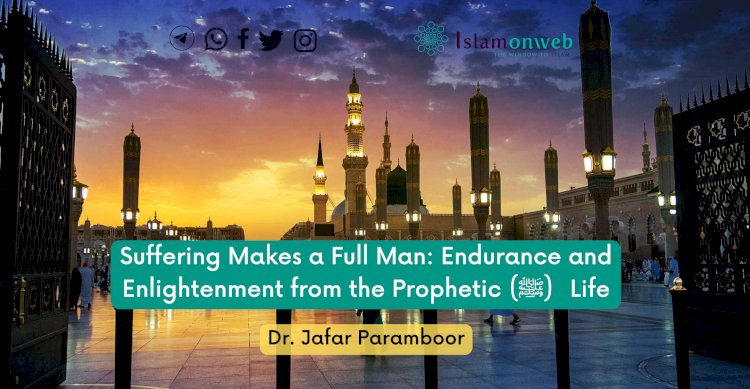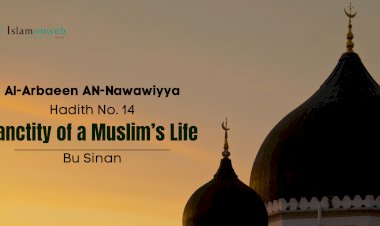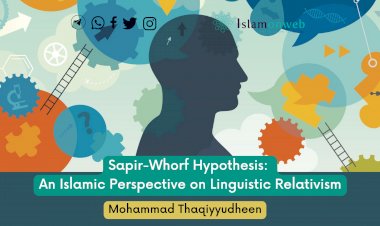Suffering Makes a Full Man: Endurance and Enlightenment from the Prophetic (ﷺ) Life
On the first night of Rabīʿul Awwal, I was cuddling, as usual, my infant before he goes to sleep. Most days, we chitchatted about what he had seen during our routine walk along the pathway near our home, like birds, rain, soil, trees, nests, plants, butterflies, cars, bikes, skies, wind, etc.
Since it was a holy night for us, like for the majority[1] of Muslims around the globe, I started my conversation with him, saying: 'Oh dear! You know that this is your first Rabīʿul Awwal! It is in this month our Mutthunabi[2] was born.' He giggled in response as I repeated the same and continued cuddling.
Meanwhile, my thought got stuck when I imagined a newborn Muhammad with no dad to cuddle and kiss on his toes. It hurt me intensely with an ultimate compassionate feeling towards that newborn, which led me to reflect on the sufferings he endured since childhood until his physical absence from the world. That is, the Prophetic life history is marked with enough afflictions that only he could bear. Similar to the state of having been chosen to be the final Prophet for humanity, the same Prophet was also destined to be the one with the maximum number of sufferings in this world. It is a significant indication from God on the life of humans on earth as if He proclaims that 'if I chose you to be a shining star among others, be also ready to endure suffering through which you are cleansed like a pearl!' Thus, the word Mutthunabi (ﷺ) encompasses this aspect too, where he is living in the hearts of millions as the most beloved while at the same time, those millions still recall the painful hardships and sufferings that Mutthunabi (ﷺ) went through, to be the pearl which is not like other pearls in the whole universe.[3]
In other words, the Prophet (ﷺ) himself was the manifestation of the truth, i.e., balā' or ibtilā' is a significant part of the Islamic worldview, through which all prophets have gone and given testimonials according to their intensity. Also, being alive as a human means to be in suffering at stages of life, as ascertained by God: "And we will indeed test you with something of fear and hunger, and loss of wealth, souls, and fruits; and give glad tidings to the patient ones."[4] (al-Baqarah: 155). Thus, it is understood that Islam, unlike other religions, never presents human suffering as a problem or cause of any problem. Instead, it is presented as a test for anyone, an act of justice by the One who created suffering and knows the wisdom behind it, and a cause for being rewarded by the Almighty in abundance. It is also marked as a conditional offer to be the beloved of God, as narrated by Abū Hurairah from the Prophet (ﷺ): "If Allah wants to do good to someone, He afflicts him with trials."[5] The divine wisdom behind giving hardships to the prophets is evident in this sense. Narrated by Mus͑ab bin Sa͑ad from his father as he mentions: I enquired to the Prophet (ﷺ), O messenger of Allah, who among people are the most afflicted with hardship? He (ﷺ) responded: 'It is the prophets, then those similar to them, and then those similar. So, one is tested with afflictions according to his religious capacity. Thus, if his religion is adamant, the hardship gets intense, and if there is any delicacy in his religion, he gets tested his religious capacity. And the affliction never ceases to befall the servant until he is left to walk on the earth with no sin upon him.'[6] Probing into the verses from the Qur'an as well as the Ḥadiths related to balā', ibtilā' and muṣībah inspiringly clarifies that hardship is divinely paid off with unimaginable rewards. Succeeding the mentioned verse of al-Baqarah, Allah details about those who are patient, as: "those who, when affliction befalls them, say, "Truly we are God's, and unto Him we return."[7] (al-Baqarah: 156)
Nature of Suffering
Suffering, from an Islamic perspective, has two facets, one being the type caused by the misuse of human freewill, and the other being predestined by the divine decree, as is understood from several verses in the Qur'an. For instance, Allah reveals: "Corruption has appeared on land and sea because of that which men's hands have earned, that He may let them taste some of that which they have done, that haply they might return." (Al-Rūm: 41). The verse refers to the first type of suffering as it is a consequence of what has been done by humans on the earth, including all kinds of injustice and violations. The previously mentioned verse of al-Baqarah (155) refers to the second type where God's language is assertive using different tools of substantiation (ta'kīd) like lām and nūn al-ta'kīd when He states he will test human beings with various afflictions and disasters.
Then, what human gets after all the sufferings is where its purpose is contextualized. In Islam, the purpose of suffering, be it of any type, is manifold, among which the spiritual purification of oneself is ultimate. That is, by facing hardships, one may attain higher positions than his current spiritual stage by being closer to God. It may also lead one to reflect and repent upon his sins and act as a turning point to return to God. In this regard, Hani (2020) counts 18 possible purposes for causing hardship to humans, referring to the Qur'an and Prophetic traditions.[8] Those include, apart from the aforementioned, for the sake of testing human's freewill, for testing someone if he/ she can help those undergoing any hardship, for reminding people to return to their God, for warding off a greater harm, for the sake of developing humility and gratitude in those who are arrogant, for reminding oneself about the insignificance of the worldly life, for spiritually and emotionally strengthening the believer etc. Thus,
'God elucidates in the Qur'an many of the justifiable wisdoms of suffering (e.g., eternal reward, strength, guidance, free will) that help human beings cope with adversity in a psychologically and spiritually optimistic manner, as well as to understand God's Wisdom, Knowledge, and Mercy.'[9]
Coming back to the suffering endured by the Prophet (ﷺ), as a matter of fact, he suffered to the extent that one of his worldly years on this earth was labelled 'year of sorrow' (͑Ām al-ḥuzn) due to a chain of disasters befell upon him in 619 CE, while nobody else on earth has been given such a year of sorrow in his/ her life. The Prophet (ﷺ) had to face severe hardships from his own circles, including family and community members who turned out to be his ardent adversaries. It was not only mental suffering due to various kinds of insults, defamation, trolls, and boycotts but also physical, which included starving, banning, abuse, and all such types that one could imagine. As Hykel (1993, p. 116) explains:
'It is nearly impossible for us to imagine the intensity and extent of the efforts which Quraysh spent in its struggle against Muhammad, or its perseverance during many long years in that struggle. The Quraysh threatened Muhammad and his relatives, especially his uncles. It ridiculed him and his message, and it insulted his as well as his followers. It commissioned its poets to revile him with their sharpest wits an to direct their caustic sting against his preaching. It inflicted injury and harm on his person and on the persons of his followers. It offered him bribes of money, of royalty and power, of all that which satisfies the most fastidious among men. It not only banished and dispersed his followers from their own country but injured them in their trade and commerce while impoverishing them. It warned him and his followers that war with all its tragedies would fall upon them. As a last resort, it began a boycott of them designed to starve them.'[10]
The ego of Quraysh kept chasing the Prophet (ﷺ) using all their power and status, whereas its pattern was of systemic oppression, organized by their super leaders, who knew that the Prophet (ﷺ) would break the chain of their authority and aristocracy, and their whole social structure built upon injustice and corruption. Undoubtedly, nobody among them had any anguish towards his personal life and characteristics since he lived with the most perfect and exemplary character even before the prophethood, being gentle and humble to the maximum. But the Arabs were shocked when they realized this Prophetic act of breaking the chain, which led them to replace his earned title, al-Amīn (the trustworthy), with Mudhammam (the cursed), whereas for the first title it took years to reach while for the latter, it did not.
Among the acts of their systemic oppression was spreading rumours against him, even at a personal level. The Prophet (ﷺ) used to drop by the shop of a Christian young man, Jabr, whenever he passed by the Marwah quarter of Makkah. The Quraysh used this as a chance to disparage the Prophet (ﷺ) by initiating a rumor that the Christian Jabr was the source of Muhammad's 'new revelations', and if anyone were to apostatize from the belief of his ancestors, the Christian should be the first one to do so.[11] Clearly, their intention was to waning off the whole idea of revelation received by the Prophet (ﷺ) since their anguish came out due to him having been 'the chosen one' (al-Musṭafā) and not someone among those they perceived noble and worthy. That is where the ego worked to the extent that, out of pure jealousy and ͑aṣabiyyah, the top leadership started lamenting, "But why Muhammad and that too from the 'other' tribe, while we and our tribe are well-deserved for it?!"[12]
He Suffered, and God Responded
Despite all the sufferings that befell upon Mutthunabi (ﷺ), what was astonishingly inspiring was his pro-action towards them, with the divine support to the core. This is what is to be called the Prophetic privilege, as God interfered for the Prophet (ﷺ) at every significant point, pleased him, encouraged him, consoled him, and counselled him. Many a time, when the Prophet (ﷺ) got exhausted and went into extreme levels of disappointment due to people's adverse comments and rejection of what he presented about the dīn, God revealed the verses of compassion and consolation. The 6th verse of Surah al-Kahf is an example as God soothes him, saying, "Yet perhaps thou wouldst destroy thyself with grief for their sake, should they believe not in this account." Similarly, in Surah al-Shuʿarā' (verses 3-6), God sympathises with the Prophet (ﷺ) due to his emotional breakdown because of his people's unbelief in his words:
"Perhaps thou dost torment thyself that they are not believers. If We will, We will send down a sign from Heaven and their heads would remain bowed before it in humility. Yet no new reminder comes to them from the Compassionate, but that they turn away from it. Indeed, they have denied it, but there shall come to them the tidings of that which they used to mock."
By these verses, the divine command appears to be like from an intimate friend and mentor stating: 'You worry not! I know your feelings, and I will take care of you indeed.' Moreover, He narrated the hardship stories of previous prophets, like Ibrāhīm (A), Ayyūb (A), Yūsuf (A), and the likes for example.[13] What if we could imagine the Prophet (ﷺ) listening to these verses from Jibril, at that moment of pain?
Among many of its kinds, another occasion of divine interference was when Khabbāb bin al-Aratt, a companion of the Prophet (ﷺ), had an encounter with ʿĀṣ bin Wāʾil, a non-believer. Khabbāb was a smith in Makkah who used to make and sell swords. He sold some to ʿĀṣ, a non-believer. However, at the time of payment, ʿĀṣ scornfully turned his back on the former, asking, 'Does not Muhammad, your companion whose religion you follow allege that in paradise there is all the gold and silver and clothes and servants that his people can desire?' 'Yes definitely', said Khabbāb. 'Then give me till the day of resurrection until I return to that house and pay your debt there; for by God, you and your companion will be no more influential with God than I, and have no greater share in it.' It was then the following verses were revealed to the Prophet (ﷺ):
Hast thou not considered the one who disbelieves in Our signs, and says, "I shall be given wealth and children." Has he penetrated the Unseen or made a pact with the Compassionate? Nay, but We shall record that which he says, and We shall prolong for him the punishment. And We shall inherit from him that which he claims, and he will come unto Us alone. (Surah Maryam: 77-80)[14]
Needless to say, this type of mockery given by ʿĀṣ is an extreme version of it by which a normal human being like us will definitely be provoked and lose temper. However, when ʿĀṣ, who represented an uncivilized mass that existed a thousand and six hundred years ago, is compared with certain current anti-Islam circles among us, we would wonder what aspect of civilization have the so-called 'scientifically tempered' circles gained throughout this period as the matter to wonder is a self-proclamation of their civilizational superiority besides the silliness in their response against Islam as an ideology. That is, the Prophetic ummah of this time is destined to suffer from these types of 'scientifically uncivilized' mass!
Conclusion: The Balance of Suffering and Divine Mercy
And what was among the highest God-given rewards to Mutthunabi (ﷺ) for bearing all these sufferings? Similar to the intensity of afflictions, the reward is also unique.
'He has made him perfect by giving him the Liwa-al-Hamd, the Banner of Praise, and the Maqam-al-Mahmud, the Station of the Praiseworthy, thereby making him the light of both worlds, messenger to both Jinn and men, and enabling him to attain the secrets of proximity to the divine station by two bows' lengths, and becoming the king of the world. Peace and blessings be upon his pure and meritorious family and his worthy companions who are pursuing the way of greatest righteousness.'[15]
In conclusion, contemplating the sufferings endured by Mutthunabi (ﷺ), we get clarified that Islamic perspectives on the philosophy of suffering place special emphasis on its inevitability as a test from God and its prospect for moral and spiritual advancement. Suffering is viewed as a complex idea with origins in human free will, divine mandate, and collective responsibility. As is explained, its goals include restitution, togetherness, compassion, and spiritual purification. Islam's ethical and spiritual responses to suffering centre on patience, prayer, and pro-action according to contextual needs, expecting the divine reward through various means that only He knows.
Most importantly, a balance between human suffering and divine mercy is always highlighted in both Qur'anic and Prophetic wisdom. The challenges due to suffering are to be overcome by humans through drawing a horizontal line of closeness istighfār (seeking forgiveness) from himself towards God and a vertical line of compassion from himself towards the world he lives in. The second line is not to be limited to that of compassion towards human beings only, but all other living beings are included. It is through this prism that a Muslim traverses the complexities of life's trials, finding strength, solace, and meaning in his/ her faith and submission to the divine will. Lastly, in a world where suffering is an inherent part of the human experience, the Islamic philosophy of suffering offers a perspective that fosters resilience, empathy, and a deepening connection to the Divine.
References
Al-Qur’an
Aminah, H. (2002). Muhammad the messenger of Islam: His life and prophecy. Islamic Supreme Council of America (ISCA).
Bukhārī, Muḥammad ibn Ismāʻīl. (1966). Saḥiḥ Bukhārī. Muhammad Sarid.
Hani, S. (2020). The problem of evil: A multifaceted Islamic solution. Yaqeen Institute for Islamic Research. Retrieved September 24, 2023, from https://yaqeeninstitute.org/read/paper/the-problem-of-evil-a-multifaceted-islamic-solution
Haykal, M. H., & Al-Faruqi, I. R. (2005). The life of Muḥammad. American Trust Publications.
Ibn Hishām, ʻAbd al-Malik, Ibn Isḥāq, M., & Guillaume, A. (2001). The life of Muhammad: A translation of Isḥāq's Sīrat rasūl Allāh. Oxford University Press.
Nasr, S. H., Dagli C. K., Dakake, M. M., Lumbard, J. E. B. & Rustom, M. (2015). The study Quran: a new translation and commentary (First). HarperOne an imprint of HarperCollins.
Tirmidhī, Muḥammad ibn ʻĪsá, (1970). Jami al-Tirmidhi. Maa sharḥihi Tuḥfat al-aḥwadhi li-Abd al-Raḥman al-Mubarakfuri. Beirut (Lebanon): Dar al-Kitab al-Arabi
Watt, W. M. (1979). Suffering in Sunnite Islam. Studia Islamica, 50, 5–19. https://doi.org/10.2307/1595556
Endnotes
[1] The other minority is of a different view on the legal permissibility and religious implication of considering Rabīʿul Awwal sacred, which we do not discuss here.
[2] Mutthunabi (മുത്തുനബി) combines two Malayalam words, Mutthu, meaning pearl, and Nabi, meaning the Prophet, as in Arabic. This is the common usage of Keralite Sunni and Sufi tradition for referring to Prophet Muhammad (ﷺ), and arguably no other phrase in Malayalam can indicate the intimateness and intensity of love and affection towards the Prophet (ﷺ) than this, as the usage is heartfelt. As is observed, this term is frequently heard from all traditional Muslim circles in Kerala since, in their mental state, the image of the most lovable human on earth, an affectionate man with the softest heart filled with compassion, the al-rahīm is more highlighted than his being as a revolutionary leader with an ideology, like what is introduced and continuously highlighted by most of the Keralite modernists and reformists, which is to me as parched as dryland. I have even come across some Facebook ‘Mufits’ who adhere to the latter category, trolling the former on their referral to the Prophet (ﷺ) as well as his family members by ‘Mutthu’, similar to what they used to ridicule and intolerably accuse bidʿah towards those celebrate the Holy birthday, unlike now whereas this trend is in a positive shift due to several reasons, including political and civilizational.
[3] Muḥammadun Basharun lā kal Bashari
Bal Huwa kal Yāqūti baynal Ḥajari
(“Muhammad -Upon Whom be Peace- is a human, yet not like (other) humans; But he is like Yaqut among other stones”, as beautifully narrated by a poet.
[4] The English translations of all Qur’anic verses are taken from The Study Qur’an: A New Translation and Commentary published by HarperCollins Publishers Australia.
[5] Al-Bukharī, vol. 7, Book 70, No. 548
[6] Al-Tirmidhī, vol. 4, p. 203, No. 2398
[7] Thus, Innā lillāh…is one of the most frequently used phrases by Muslims when they face any challenges in their life, regardless of its intensity. It is commonly recited when death is announced and listened to.
[8] Hani, S. (2020). The problem of evil: A multifaceted Islamic solution. Yaqeen Institute for Islamic Research. Retrieved September 24, 2023, from https://yaqeeninstitute.org/read/paper/the-problem-of-evil-a multifaceted-islamic-solution
[9] Ibid.
[10] Haykal, M. H., & Al-Faruqi, I. R. (1993). The life of Muḥammad. American Trust Publications.
[11] Ibid.
[12] Ibid.
[13] For an extended description, see Watt (1979).
[14] Ibid. p.162
[15] Hajjah Amina (2002). Muhammad the Messenger of God, p.45.
About the author
Dr. Jafar Paramboor is an Assistant Professor at Kulliyyah of Education, International Islamic University Malaysia.
Disclaimer
The views expressed in this article are the author’s own and do not necessarily mirror Islamonweb’s editorial stance.

























Leave A Comment